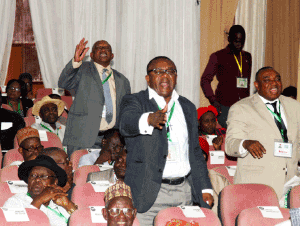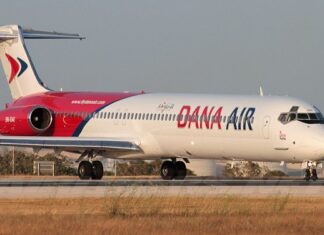Assistant Editor (North), CHUKS EHIRIM, writes that campaigners for total removal of fuel subsidy made another attempt at sustaining it at the ongoing national conference, but met a brick wall…
Delegates demanding recognition by the Conference Chairman during the debate on the report of the Committee on Public Finance
To most people in Nigeria, the great uprising of January 2012 over the hike in the prices of petroleum products in the country was more than enough signal to the government that the politics of fuel subsidy should be rested. But events after the nationwide protests show that nothing was learnt. The apostles of fuel subsidy removal, notwithstanding its pains on the citizenry, have continued to campaign for public attention.
The campaign was brought to the national conference via the Committee on Public Finance and Revenue headed by the former Governor of Kebbi State, Adamu Aliero, which report recommended full scale fuel subsidy removal. When debates commenced on the subject matter, it was obvious that the pro-subsidy removal cabal had done a lot of lobbying to sustain the recommendation of the Aliero-led committee on the issue.
Again, the usual blackmail by government and its apologists on the matter was unleashed on the floor of the conference last Tuesday. Chief among this was the argument that government has been subsidising the price of petroleum products just for the elite, as ordinary Nigerians have no business in buying fuel.
Among those who argued in this respect were Senator Aniete Okon, Orok Duke, Sergeant Awuse, etc. They however met their match in such delegates as Dan Nwanyanwu (National Chairman of the Labour Party), Mike Ozhekome, Jaye Gaskya, Ibuchukwu Ezike, Senator Offia Nwali, Nasir Kura, Femi Falana and a host of others.
The pro-subsidy removal group had argued that sustenance of the subsidy regime amounts to waste of public resources which end up in the pockets of Nigeria’s super rich.
Speaking to journalists even after the plenary had settled for non-removal of fuel subsidy, Duke argued forcefully that “the people who consume most are still government people. The rich man consumes more because any amount you sell fuel to the commercial driver, he will pass it to the customers – the masses; so he does not lose. So, the rich people are the ones being subsidised. We need to remove it and nothing will collapse.”
Duke, in the course of the debate, made a statement which the likes of Falana found distasteful and demanded retraction or apology from him. The statement bordered on his (Duke’s) claim that the January 2012 fuel subsidy removal protests were actually sponsored by those who were making huge gains from it, at the expense of the masses.
But Gaskya, a civil society delegate, in his submissions, disagreed with Duke’s argument. He wondered why there is subsidy in the first place.
“The problem is because we import refined products. The subsidy is to pay for the difference in the cost. That is why there is a subsidy. The solution to that is to ensure that we have adequate domestic refining capacity, not to remove any subsidy. That is the solution and we recall that in 2012, when this same issue came up, in the cause of those mass protests against government by Labour and civil society, it was said then that it would take nine months, up to the end of 2012, to bring the domestic refineries up to optimum capacity, which will curb the necessity for imported fuel, that it would take 18 months to build new refineries.”
“Again, at that time, licences were given for four greenfield refineries. Twenty-four months after, the refineries are still working at less than 40 per cent capacity. Not even the soil has been dug for these refineries. If all of these things have been done, by now, we will not be talking about subsidy. That is the issue. The committee came out with what I call one-sided argument. The committee mentioned in 2010, 2012 and 2013, the price we paid for subsidy. Why was it that in 2010 we paid less than N600 million? Daily consumption rate was less than 30 million litres. But suddenly in 2011, it jumped to 60 million litres per day.
“Why is it that after the January uprising, the figure came back to less than 40 million litres per day in 2012 and we paid N122 billion in 2012? Yet as all these things are happening, nobody is in jail, none of these funds has been recovered.
“What we need to do, as I suggested two years ago, is to set aside two years and make sure that within that period, we have made adequate preparation for domestic refining capacity in the country, and let us see if we can still be talking of subsidy after that.
“On a final note, we must be very careful in the midst of this grievous insecurity problem that we have in the country, in a country with 70 per cent poverty rate, 35 per cent unemployment rate, with the third largest concentration of poor people in the world. We should be wary about the decisions that we make that can further provoke insecurity. People here may not know the value of oil to the ordinary Nigerian. Eighty per cent of the citizens generate 70 per cent of their own power (electricity), including small scale businesses.
“All small-scale businesses generate more than 80 per cent of their power. They depend on generators using PMS premium motor spirit). When you do this (remove fuel subsidy), more industries are going to fold up, more people will be unemployed, there will be more poor people, more danger in the streets, more kidnapping, and greater insecurity. We should be careful about the decisions that we make,” he said.
What seemed to have been the most brilliant contribution on this debate came from Prof. Anya O Anya, who advised the authorities in Nigeria to, rather than the continued castigation of the young people who are involved in what is referred to as “illegal refinery” business in the Niger Delta, encourage such persons to refine more for local consumption which will eventually put the fuel importation moguls in the country out of business.
Anya, who frowned at the sorry state of Nigeria, a major oil-producer, exporting crude oil and importing finished products at exorbitant cost to the final consumers, won the hearts of almost all his colleagues that day.
Following from his submissions, speaker after speaker among the antagonists of fuel subsidy removal made reference to his views in arguing that the committee’s recommendation be thrown out. This was the decision when Nwanyanwu, on behalf of 23 other delegates, moved a motion, demanding that the federal government should, “within a period of three years from the date, build new refineries and repair existing ones to full capacity utilisation”.
They also recommended that private sector entrepreneurs who have already been granted licences to build new refineries shall, within a period of three years from date, build such new refineries, or automatically forfeit such licences, to enable other participants who are ready and willing to build such refineries within a period of three years, the opportunity to do so; that upon fulfilment of the conditions, the federal government shall be free to remove any existing subsidy from petroleum products”.
When the motion was put to voice vote, an overwhelming majority of the delegates endorsed it.











